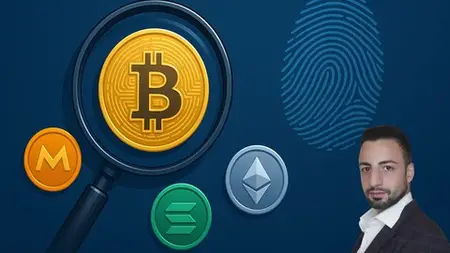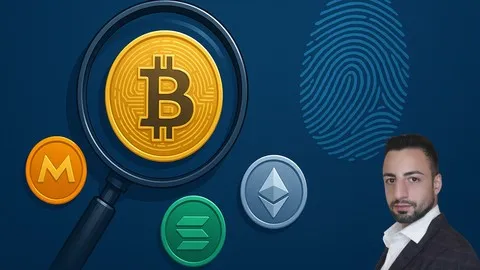Cryptocurrency Forensics 2025: Full Guide
Published 5/2025
MP4 | Video: h264, 1920x1080 | Audio: AAC, 44.1 KHz
Language: English | Size: 517.21 MB | Duration: 2h 35m
Published 5/2025
MP4 | Video: h264, 1920x1080 | Audio: AAC, 44.1 KHz
Language: English | Size: 517.21 MB | Duration: 2h 35m
Learn cryptocurrency forensics: trace funds, detect mixers, investigate wallets, and follow blockchain trails.
What you'll learn
Understand the fundamentals of blockchain technology, wallets, private/public keys, and how cryptocurrency transactions work.
Trace and analyze blockchain transactions on Bitcoin, Ethereum, and privacy-focused cryptocurrencies like Monero and Zcash.
Identify wallet structures, address types, and transaction patterns using forensic techniques such as clustering, change address detection, and UTXO tracing.
Investigate obfuscation tactics including CoinJoins, mixers, DeFi swaps, and cross-chain laundering via bridges and token swaps.
Apply forensic methods to real case studies such as the BitMart hack, Crypto-com breach, Tornado Cash laundering, and Ronin Bridge exploit.
OSINT techniques: search devices for crypto addresses, keys, and seed phrases using regex, crack Ethereum wallets, trace Bitcoin ATM activities and more.
Requirements
No prior experience in blockchain or forensics is required — the course starts with the basics.
Basic computer knowledge and comfort using web-based tools and platforms.
Description
Learn how to trace Bitcoin, Ethereum, and Monero transactions using real-world blockchain forensics and crypto investigation techniques. This course is designed for cybersecurity professionals, law enforcement, compliance officers, and blockchain analysts who want to follow the money across crypto networks.You'll start with the fundamentals and progress to advanced forensic techniques used in real investigations.What You’ll Learn:How wallets, private keys, seed phrases, and addresses work across Bitcoin and EthereumBlockchain analysis using the UTXO model, account-based systems, and smart contractsDetecting laundering tactics: CoinJoins, mixers, cross-chain swaps, and DeFi obfuscationIdentifying change addresses, wallet clusters, and suspicious transaction patternsUsing OSINT and regex to search systems for wallet files, addresses, and seed dataTracing privacy coins like Monero and Zcash, and understanding their forensic limitationsInvestigating real cases: BitMart hack, Ronin Bridge exploit, Crypto-com 2FA breachTools of the trade: public explorers and commercial platforms used by law enforcementSeizing crypto assets and tracking transactions across networks and DeFi protocolsAnalyse USDT, swapping methods and much more.By the end of this course, you'll be equipped with the skills to analyze crypto crime, trace transactions with confidence, and apply forensic investigation techniques across Bitcoin, Ethereum, and beyond — including privacy coins and decentralized finance.
Overview
Section 1: Introduction to Cryptocurrency Forensics
Lecture 1 Welcome to the Course
Lecture 2 What You Will Learn
Lecture 3 Introduction to Digital Money and Blockchain Basics
Section 2: Wallets, Keys, and Address Structures
Lecture 4 Hot vs. Cold Wallets
Lecture 5 Public and Private Keys
Lecture 6 Hierarchical Deterministic (HD) Wallets and BIP Standards
Lecture 7 Investigative Insights into Wallets
Section 3: Blockchain Transaction Models
Lecture 8 How Blockchain Transactions Work
Lecture 9 The UTXO Model (Bitcoin)
Lecture 10 The Account-Based Model (Ethereum)
Section 4: Bitcoin Forensics
Lecture 11 Analysing a Bitcoin Address
Lecture 12 Address and Private Key Formats
Lecture 13 Change Address Identification Techniques
Lecture 14 Concept of Clustering
Lecture 15 CoinJoin and PayJoin Explained
Lecture 16 An Eye on the Fork
Lecture 17 No Input Transactions
Section 5: Ethereum Forensics
Lecture 18 Ethereum Fundamentals
Lecture 19 Understanding Ethereum Transactions
Lecture 20 Smart Contracts
Lecture 21 Non-Fungible Tokens (NFT) Forensics
Lecture 22 Tornado Cash & zk-SNARKs
Lecture 23 Decentralized Finance (DeFI) - Liquidity Pools and Swapping
Lecture 24 Analysing a DeFi Hack
Lecture 25 Uncover Staking Accounts
Section 6: Privacy Coins and Obfuscation Tactics
Lecture 26 Monero Basics
Lecture 27 Monero Tracing Strategies
Lecture 28 Zcash Shielding and Deshielding
Section 7: Public Resources & Commercial Tools
Lecture 29 Introduction to Public Blockchain Explorers
Lecture 30 Bitcoin Blockchain Explorers
Lecture 31 Etherscan
Lecture 32 Commercial Tools
Lecture 33 Graphical Tracing Tools
Section 8: Real-World Case Studies
Lecture 34 Types of Crypto Crimes: Scams, Hacks and Fraud
Lecture 35 Case Study 1 - BitMart Hack
Lecture 36 Case Study 2 - Crypto 2FA Bypass
Lecture 37 Case Study 3 - Ronin Bridge Hack & North Korean Link
Section 9: Alternative Blockchain Analysis
Lecture 38 USDT and Cross-Chain Bridges
Lecture 39 Solana Forensics
Lecture 40 Wormholescan
Section 10: Investigative Techniques and Countermeasures
Lecture 41 Identifying Blackbox Services & Bitcoin ATMs
Lecture 42 Seizing Crypto Assets (Wallets, MetaMask, Seeds)
Lecture 43 Crack Passphrase Protected Ethereum Wallets
Lecture 44 Scan Devices for Addresses, Keys and Seeds
Lecture 45 Using Public Databases (OSINT)
Law enforcement, compliance officers, and digital forensic investigators seeking practical skills to follow the money on-chain.,Crypto enthusiasts and ethical hackers,Anyone curious about how crypto crimes work



